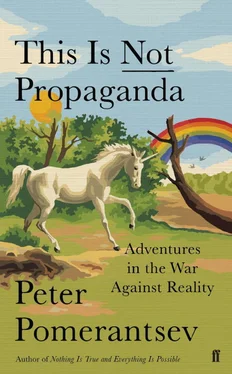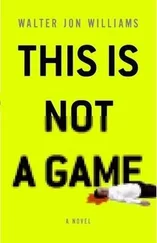Objectivity Is a Myth Imposed Upon Us
Forty years later, my office is opposite the old Bush House. The BBC World Service has long since abandoned it. First it was mooted that Bush House would be sold to Japanese property developers and converted into luxury apartments. This plan failed when the UK property market started sagging in the wake of the 2008 financial crash. It now houses a university.
All of the BBC – World Service and domestic, news and entertainment, TV, radio and ‘multimedia’ – is squeezed into a building at the top end of Regent Street that is curved like a compressed accordion, with people sitting far too closely together, so that it feels like the architects forgot to factor in the right amount of desk space in their design.
When I talk to BBC editors and managers, the architectural misproportion seems to mirror a media one: the world has changed and the old values of the BBC – of accuracy, impartiality and fairness leading to democracy, reasonableness and debate – have been upended.
During the Cold War the BBC defined ‘impartial’ as a balance between left-wing and right-wing opinions. In the 1990s and 2000s things got more complicated. There was no clear left or right any more. In the late 2010s audiences have fractured even more, seeing the world through the distinct values and causes that define them.
‘Even as affiliation to political parties has weakened, the importance of values people identify with, such as religion, the monarchy or minority rights, have become stronger,’ James Harding, the former director of BBC News, told me. ‘And so, with it, perceptions of bias and how people understand impartiality have changed, well beyond traditional ideas of left and right.’
The BBC used to determine what to be impartial about by following the agendas set by the political parties and, to a much lesser extent, newspapers. These were meant to be representatives of greater interests. But what happens when newspapers are no longer read and parties are so fractured that they no longer represent anything coherent? When I was in Britain as a child, we lived in a series of sublimations, our sense of self squeezed into the vessels of media and sucked through the cathode-ray tube of the TV to join a greater whole. For better or worse, those vessels have burst. And as a consequence the concepts which the BBC used to negotiate reality have been scattered. Even at the best of times the BBC struggled to get ‘balance’ right, [2]but what does it mean to be impartial in such a fractured world?
To be fair, impartiality always was a slippery term. Back in the 1980s Margaret Thatcher’s government was fighting a war against the domestic BBC, accusing it of being biased for attacking Conservative politicians, of being disloyal for broadcasting Irish terrorists. There were even threats to close the BBC down: why should one have a publicly funded broadcaster if Thatcher believed in market freedom? But now the attacks are not just on the BBC’s impartiality, but on the very idea that impartiality and objectivity can exist at all.
In Russia, Kremlin-controlled media heads and stars insist that broadcasters such as the BBC can’t be trusted as they all have hidden agendas, [3]that ‘objectivity is a myth that is proposed and imposed on us’. [4]It’s a far cry from Radio Moscow, with its commitment to upholding scientific, Marxist truth. And you can see the difference in the content. When, in the 1980s, Radio Moscow broadcast ‘active measures’ claiming that the CIA had invented AIDS as a weapon against Africa, the lies were carefully curated over many years. They involved scientists in East Germany who had supposedly found the evidence. An effort was made to make the elaborate lie look real. Today the Russian media and officials push similar stories, claiming that American factories were pumping out the Zika virus in East Ukraine to poison ethnic Russians, that the US is harvesting Russian DNA to create gene weapons, [5]that the US is encircling Russia with secret biological warfare labs. But these claims are just thrown online or spewed out on TV shows, more to confuse than to convince, or to buttress the phobias of audiences predisposed to seeing US plots all around them.
In the US, impartiality is also under attack. Ted Koppel was one of the country’s most famous news broadcasters during the Cold War, objectivity personified. In 2017, on his CBS morning show, Koppel accused partisan cable news channels on the left and the right of undermining reasonableness and debate. Koppel was placing himself above the fray, implicitly making the case that balance and objectivity were still possible. After all, there has to be a position from which you can judge partisanship. One of his main targets was the Fox News prime-time TV host Sean Hannity, as virulent a defender of Donald Trump as Russian state TV presenters are of Vladimir Putin. Hannity responded that by attacking opinion shows, Koppel was actually just ‘giving his opinion’. Hannity described himself as honest because he admitted to being an advocacy journalist, whereas Koppel’s facade of being impartial was actually fraudulent. All pretence at objectivity was just subjectivity.
With the possibility of balance, objectivity, impartiality undermined, all that remains is to be more ‘genuine’ than the other side: more emotional, more subjective, more heroic. Hannity’s studio features a superhero-style shield, reminiscent of Captain America’s, with the Stars and Stripes and his name emblazoned upon it. In the Hannity mythos, the Fox hero has to fight off the monsters of the ‘alt-left-destroy-Trump media’, who have declared ‘war on the American people’.
When Hannity lands on a failing of other media – the way some channels spent so much airtime trying to detect direct, covert, criminal ‘collusion’ between Trump and the Kremlin, for instance – his response is not to try and restore impartiality, but to say it is impossible per se.
The irony is that the rejection of objectivity pushed by the Kremlin and Fox News plays on ideas that originally championed ‘liberal’ causes which the Hannitys and Putins of this world oppose. ‘Objectivity is just male subjectivity,’ was a slogan of the feminist movement; the student protests of 1968 celebrated feelings as an antidote to corporate and bureaucratic rationality.
But now Fox and the Kremlin exploit the same ideas: if reality is malleable, why can’t they introduce their own versions too? And if feelings are emancipatory, why can’t they invoke their own? With the idea of objectivity discredited, the grounds on which one could argue against them rationally disappears. [6]
*
With the objectivity and impartiality of a network like the BBC or CBS undermined, online fact-checking agencies have stepped into the fray. However, they too face a problem: the very technology they work in, social media, where falsehoods spread faster than facts. [7]It’s become something of a ritual: hauling up representatives of tech companies and lambasting them for normalising lying.
Take the summer of 2018 in Rome, where I attended the annual gathering of the world’s fact-checkers.
‘If this group can’t help make the information disorder problem a little less terrible, if this group can’t clean up this mess that we’re in, who will? We are the wrinkly arbiters of a take-no-prisoners war for the future of the Internet,’ announced Alexios Mantzarlis, developer of the ‘Fact-Checkers Code’, which defines the ‘Five Principles of Transparency and Methodology’. The principles establish who is a real fact-checker and who isn’t. Mantzarlis’s code was often invoked in Rome. Prospective fact-checkers are monitored over a year to ensure they live up to the five principles. Among the greatest dangers to the movement are the wrong kind of fact-checkers, who claim the status for themselves without following the principles. Perhaps it was the fact that we were in Rome, but I began to feel that there was something a touch religious about the fact-checkers. In a world where facts have become sullied, they wanted to make them sacred again.
Читать дальше












